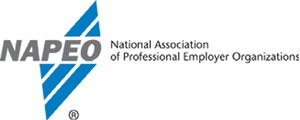
President Signs Legislation Defining Professional Employer Organizations In The Federal Tax Code
Recognition Means PEOs Can Help More Small Businesses Grow and Thrive
News provided by
National Association of Professional Employer Organizations (NAPEO)Dec 22, 2014, 09:33 ET
WASHINGTON, Dec. 22, 2014 /PRNewswire-USNewswire/ -- The National Association of Professional Employer Organizations (NAPEO) today hailed President Obama's signing of tax extenders legislation that included provisions defining professional employer organizations (PEOs) in the federal tax code and creating a voluntary certification program for PEOs within the IRS. PEOs provide comprehensive HR, benefits, tax administration, and compliance services for small and mid-size businesses.
"This is an historic moment for the PEO industry because Congress has now formally codified PEOs within the tax code and recognized the key role PEOs play in helping small businesses grow and thrive," said NAPEO President and CEO Pat Cleary. "The certification program created by this legislation provides added assurance to small business owners who want to turn to a PEO to handle their employment tax issues and back office administrative and HR tasks."
The legislation (the Small business Efficiency Act/SBEA) creates a voluntary certification program for PEOs within the IRS. To become IRS-certified, a PEO would have to meet financial standards (including bonding and independent financial audit requirements) and satisfy reporting obligations and other appropriate standards set by the IRS. Once certified, a PEO would take on sole liability for the collection and remission of federal employment taxes for worksite employees. Small and mid-sized businesses that contract with certified PEOs would be assured that they would not be liable for employment taxes once they remit their employees' tax withholdings to the PEO. The key champions of the bill were Reps. Kevin Brady (R-TX) and Mike Thompson (D-CA), and Sens. Chuck Grassley (R-IA) and Bill Nelson (D-FL).
"Now that the bill has been signed, we look forward to rolling up our sleeves and working with the administration to develop an effective regulatory framework. Our hope is that the process will begin soon since the bill language provides a relatively tight implementation timeline," said Cleary.
Approximately 250,000 businesses use PEOs, and PEOs provide access to healthcare coverage for as many as six million people. Through a PEO, the employees of small businesses gain access to employee benefits such as 401(k) plans; health, dental, life, and other insurance; dependent care; and other benefits typically provided by large companies. According to a recent study, by noted economist Laurie Bassi, businesses in a PEO arrangement grow 7-9 percent faster, have 23-32 percent lower employee turnover, and are 50 percent less likely to go out of business than companies not using a PEO.
About NAPEO
The National Association of Professional Employer Organizations (NAPEO) represents about 85 percent of the industry's estimated $92 billion in gross revenues. NAPEO has 300 PEO members, ranging from start-ups to large publicly held companies with years of success in the industry, as well as 200 service provider members. PEOs provide payroll, benefits, and other HR services to small and mid-sized businesses. Approximately 250,000 businesses and more than 2.5 million people are part of PEO arrangements. For more information about NAPEO, please visit www.napeo.org.
To view the original version on PR Newswire, visit:http://www.prnewswire.com/news-releases/president-signs-legislation-defining-professional-employer-organizations-in-the-federal-tax-code-300013076.html
SOURCE National Association of Professional Employer Organizations (NAPEO)






Share this article